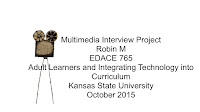My sons have been listening to podcasts for years. I’d ask H, “What are you listening to?” The response? “The newest Rooster Teeth Podcast”. Then he’d turn to his brother and ask, “Hey, Z, have you heard the new podcast?”
At the time I never really thought much about podcasts. What exactly is it? The boys had iPods and were listening to a series of broadcasts—hence podcast. According to Roy & Roy (2007), a podcast is a “cognitive medium and is available on demand for a specific topic. The term ‘cognitive medium’ suggests that it helps the user know, not do” (p. 481). Now I realize the potential podcasts have for adult learning. One of the advantages of the podcast is convenience of accessing and listening. A podcast can be accessed on a computer, downloaded to a portable device, or even live-streamed through a web service (King & Cox, 2011). This gives the user options to listen any time or any place—at home, in the car, even while exercising. According to the Pew Research Center, in 2010 47% of American adults owned an mp3 player, such as an iPod with 75% of young adults ages 18-29 owning one (Smith, 2010).
The options for non-formal and informal learning through podcasts seem almost limitless! According to Huang & Yang (2014), Apple launched the educational app iTunes U in 2007 allowing users to access free audio and video lectures from elite universities such as Stanford, Yale, MIT, Oxford, etc. Although some are private, iTunes U offers over 50 million free files, including podcasts. In March 2013, iTunes U had been downloaded more than a billion times; users from all over the world access digital files from over 1200 colleges, universities, and organizations.
Podcasts are being used for formal learning also. In their study on podcasts and adult learning theories, Luna & Cullen (2011) found that students felt more productive when listening to podcasts than they did from just reading the material. They tended to multitask while listening, predominately taking notes.
While I’ve covered the potential for podcasts, there can be some downsides. Podcasts on their own are a passive medium with no option for collaboration. Audio only podcasts can be dry or boring and may not be suitable for complex topics.
As for me, I am going to check out Yale University’s Roman Architecture on iTunes U as well as a podcast series on Italian Survival Phrases.
Ciao
rlm
Huang, R., Lu, L., & Yang, J. (2014). The evolution of university open courses in transforming learning: Experiences from mainland China. In D. G. Sampson, D. Ifenthaler, J. M. Spector, & P.
Isaias (Eds.), Digital systems for open access to formal and informal learning (pp. 25-39).
Switzerland: Springer International Publishing.
King, K. P., & Cox, T. D. (2011). The professor’s guide to taming technology. Charlotte, NC: Information Age Publishing, Inc.
Luna, G., & Cullen, D. (2011). Podcasting as complement to graduate teaching: Does it accommodate adult learning theories? International Journal of Teaching and Learning in Higher Education, 23, 40-47. Retrieved from http://files.eric.ed.gov/fulltext/EJ938577.pdf
Roy, A. K., & Roy, P. A. (2007, November 2007). Intersection of training and podcasting in adult education. Australian Journal of Adult Learning, 47, 479-491. Retrieved from files.eric.ed.gov
Smith, A. (2010). Americans and their gadgets. Retrieved from http://www.pewinternet.org/2010/10/14/americans-and-their-gadgets/
 Recently I sat down with Tammy, Director of Teacher Training, at Fundamental Learning Center in Wichita, KS. to discuss their incorporation of distance learning as an option for teacher and parent training in a multisensory structured language program.
Recently I sat down with Tammy, Director of Teacher Training, at Fundamental Learning Center in Wichita, KS. to discuss their incorporation of distance learning as an option for teacher and parent training in a multisensory structured language program.